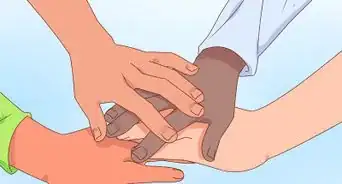This article was co-authored by Trudi Griffin, LPC, MS. Trudi Griffin is a Licensed Professional Counselor in Wisconsin specializing in Addictions and Mental Health. She provides therapy to people who struggle with addictions, mental health, and trauma in community health settings and private practice. She received her MS in Clinical Mental Health Counseling from Marquette University in 2011.
There are 8 references cited in this article, which can be found at the bottom of the page.
This article has been viewed 40,244 times.
Talking to your siblings about your sexuality is a massive step in developing your independence and self-confidence. Bisexuality in particular is often perceived negatively, and some people – whether consciously or otherwise – are threatened by the reality of sexual identities other than those they’re familiar with.[1] While friends and lovers are often considerate and understanding of your lifestyle and identity, siblings can be more hesitant, or even critical, of the changes you go through as you grow into adulthood and determine the life you wish to live.
Steps
Telling Your Siblings About Your Sexuality
-
1Tell them in person if you can. There are plenty of ways you can go about sharing the information you’re hoping to convey to your siblings. Your relationship with them, as well as any potential qualms on their part will factor into this decision.[2]
- It may seem hard to bring up the conversation. You can ease into a more serious conversation by saying something like, “There’s something important that I want to tell you because you mean a lot to me.”
- Also include some reassurance with a statement that indicates your comfort with your own bisexuality. Say something like, “I’m happy and healthy!”
- Consider telling your siblings one at a time. This route offers you the chance to take a different approach with each of the people you hope to share the news with.
- For instance, you may have a sibling with whom a conversation in the car may work best, so as to facilitate a conversational dynamic in which eye contact isn’t as frequent as it may be face-to-face.
- Be straightforward. If your siblings may be unsure what you mean when you tell them you’re bisexual, follow up with “I’m attracted to both men and women.”
- Go for a walk. Walking may be the very best way to have any sort of conversation with anyone. The fresh air, the mobility, the privacy, and more all provide a comfortable context in which to share a meaningful, heartfelt conversation.
- However you choose to tell your siblings, be sure to include something along the lines of “I love you, and I want us to have an honest, positive relationship.”
-
2Consider letting them know non-verbally. A face-to-face conversation may be too intense for either you or your siblings. Some people will benefit from the distance and time allowed to digest the news, whereas a face-to-face conversation may lead to rash or overly emotional reactions.
- Especially if you came from a home that was aggressively religious, culturally one-dimensional, or generally lacking in conversations about sex, notifying your siblings of your sexual orientation might initially upset them.
- While texts and phone calls could work, writing a letter might be the best way to tell somehow who might need a while to come to terms with the news. Calls risk putting someone in a situation where they feel like they need to respond, and may not know how. Texts are a rather impersonal way to communicate, unless you’ve developed a communication style with one of your siblings that would facilitate the use of texts to convey something meaningful.
- Letters, on the other hand, allow you to express your thoughts openly, slowly, and clearly. You can also express your love for your siblings and share everything you would want to in a face-to-face conversation, and allow them the chance to read it at their pace and contact you when they are ready to speak with you.[3]
- Start the letter by sharing how important your family is to you, and that you always want their support. Include statements like, “I’m writing to share a part of myself with you, because I value our relationship” and “More than anything, I always want to have your love your support, and you always have mine.”
Advertisement -
3Speak slowly and calmly. If you’re with your siblings when you tell them, you want to be sure everyone understands what you’re saying. More importantly, you want to convey a comfortable calmness. Even if you feel understandably nervous, remaining calm will help your siblings stay calm as well.[4]
- One option is to gather all of those you hope to speak with in a private place and explain that you want them to know something that means a great deal to you.
- Explain simply that you feel your sexuality is a significant aspect of who you are and that you want to talk about it with them. Again, be clear that you’re comfortable and content with your sexuality, as this may assuage some concerns that they may otherwise have.
- Try something like, “I’m comfortable with my sexual orientation and I’m happier and more confident than I ever have been. Of course, I still want you all to be a part of my life, and to maintain the love we share.”
-
4Ask for your siblings’ support. We all need support in our lives, especially when we’re going through periods of increasing self-awareness and transformation. Support from our siblings in particular is an incredibly significant source of our internal strength, our ability to connect with others, and our well-being in general.
- Tell your siblings you value the relationships you have with them, that they have your support, and that you hope to have their support as well.
- Share any experiences of isolation you’ve felt, particularly on account of any of your family members’ behavior.
- If your siblings are unable to provide you with emotional and other forms of support quite yet, find a community in which you can get the support you need.
-
5Be patient. You don’t know how the conversation will go ahead of time. It may go better than expected, and you may wind up feeling relieved and ecstatic to have spoken with your siblings about something so important to you. But some of your siblings may seem worried, angry, or even responsible. They may need time and space to come to terms with what you’re telling them.[5]
- As much as you’ve thought about your own sexuality, recognize that they may not have given it too much thought.
- Know that feelings of shock, denial, and even guilt are common among family members encountering this sort of news. While this is unfortunate, don’t be surprised if your siblings seem surprised at first.
- Allow them to express their own feelings, and listen calmly and patiently to their responses.
- Know that you may have to repeat yourself. Sometimes people will deny, resist, or ignore your bisexuality. You may even need to have a similar conversation again, perhaps after they’ve have a while to come to terms with what you already told them.
-
6Anticipate questions that might come up. These may include some personal, and potentially even intimate questions. Know that you don’t have to answer any question that makes you uncomfortable, but that your answers may help them come to terms with your bisexuality.
- Your siblings may be curious or even confused about what your telling them. They may have all sorts of questions about how you can be sure and what bisexuality is and more. Be open and honest with them, but know that short, simple answers will usually suffice.
- They may object to what you’re telling them. Don’t try to reason them into accepting your identity. If they’re resistant to the idea, you will not be able to reason with them.
- It may be best to answer questions you aren’t sure how to answer by re-iterating that you only want their love. Be explicit by saying things like “All I need from you is your love and support.”[6]
- They may even be skeptical. If you get the all-to-common “How do you know?”, feel free to answer simply by saying, “I just know!”
Dealing with Potential Animosity from Your Siblings
-
1Know the facts. Though the concept of bisexuality is often particularly hard for some to come to terms with, understanding bisexuality can be extremely helpful in learning more about sexual orientation, gender, and even the mysteries of attraction and our subsequent treatment of one another.[7]
- Recognize that bisexuality is more common than homosexuality. Yup. Even people who recognize that sexuality and gender are fluid are often surprised to learn of the greater frequency with which people identify as bisexual.
- While some people assume bisexuality is more common for women, many men identify as bisexual as well.
-
2Know that people are sometimes especially skeptical of bisexuality. Insecurity, bigotry, and ignorance bring out to worst in people, and many people – even people you may love – may not initially recognize your right to identify as you wish.[8]
- Bisexuality is especially tough for some people to accept. Even people who are comfortable with the concept of homosexuality may reject the concept of bisexuality because it may radically challenge their assumptions about sexual orientations.
- An inability to comfortably categorize other’s as either alike or different from themselves, especially in the context of behavior or identity regarding aspects of our lives (like sex) that some people are especially sensitive about can lead to particularly vehement demonstrations of insecurity.
- Never allow your siblings to hurt or disrespect you. If they use offensive or aggressive language, or become visibly angry, postpone the rest of the discussion until everyone is calm. Have a friend or parent talk to them if this behavior continues.
-
3Rise above it. We live in a heterosexist society. The assumption that heterosexuality is “normal” is an extremely significant aspect of many people’s thoughts and behaviors. Challenges to this assumption, including real-world evidence that contradicts heteronormativity, commonly make people uncomfortable. This discomfort is what the term homophobia refers to.
- Know that people’s fear does not mean they cannot learn to be more understanding. Often, people are unaware of their prejudice. This does not justify any rude or insensitive behavior. If you are mistreated by people who are bigoted or otherwise insecure, know that it has nothing to do with you.
- Many people still do not understand the incredible complexity of human sexual orientation. Though we celebrate diversity in other ways, many people are judgmental of people who identify with minority categories of sexual identity.
- Most people’s views will change as they have more positive interactions with people like you!
-
4Stay positive. Simply by being a positive, friendly person, you may help people recognize that sexual orientation does not at all dictate your worth and quality as an individual.
- Social equality in terms of sexual orientation is rising, and your ability to have conversations about how you identify with your friends and family will help facilitate this process.
- Do not feel as though it is your responsibility, or that you are obligated in any way to educate people about the way that you or others identify. Simply know that when these conversations do occur, they do help people better understand the diversity, wonder, and excitement that members of our species are capable of sharing with one another.
Taking Care of Yourself
-
1Build up the necessary courage. The tension associated with uncertainty about whether you should tell people in your life about your sexual orientation can contribute to stress and unhappiness. If you want to share your identity with your siblings and feel ready to do so, go for it!
- If you’re nervous, know that you’re not alone. In fact, less than a quarter of people who identify as bisexual are entirely open about it with others.[9]
- If you don’t feel ready to tell your siblings, or simply don’t want to, it’s entirely okay. There’s no reason you have to do so, and it’s fine to wait until you feel comfortable doing so.
-
2Talk to others beforehand. Consider getting someone else’s advice on how to begin the conversation and how to respond to any potential responses. By speaking to those who know you and your siblings, you can be better prepared to ensure the conversation goes smoothly and respectfully.
- Talk to a friend who has had similar conversations before.
- Talk to one of your parents.
- Consider inviting someone to join the conversation. Tell them that you don’t need them to speak for you, but that their support would help.
-
3Take care of yourself. Your own self-confidence and sense of self-worth depends on your ability to accept the sexual orientation you identify with. Embracing your sexuality as a meaningful part of who you are will help you stand up to the unique challenges you may face as a bisexual person.
- Don’t allow yourself to become consumed by emotional turmoil. Wishing, or worse, praying to be different than you are is a sure way to guarantee your own unhappiness.
- Questioning who you are makes it harder to achieve goals in your life generally, and makes it more likely that you will become depressed or overuse substances.
- Recognize negative, detrimental, or dangerous behaviors before they take over your life. If you’re struggling with addiction or depression, get professional help.
- Speak with a therapist or counselor. While you know your siblings better than most people, there are also trained professional who can help you deal with experiences such as those you’re going through.
- Again, you’re not alone. Almost a third of LGBT youth attempt suicide. If you ever have suicidal thoughts, call or text 988.
-
4Find support online. There are countless websites geared towards bisexual people that offer information and stories. Even better, there are online communities of people who are ready and willing to support you.
- Check out the It Gets Better Project. This website posts supportive stories from people who identify as having a minority sexual orientation. Stories are posted by people from all over the world.[10]
- Visit Being Gay is OK. This website is designed specifically for people under 25, and provides helpful, supportive advice for young people coming to terms with their sexuality.[11]
- Explore the LGBT Foundation website. The foundation’s website provides a wealth of information on available types of support and much more.
References
- ↑ http://www.goodtherapy.org/blog/10-things-you-might-not-know-about-bisexuality-0814144
- ↑ https://www.psychologytoday.com/blog/gay-and-lesbian-well-being/201103/should-you-come-out-your-parents
- ↑ http://emptyclosets.com/home/pages/resources/coming-out-letters.php
- ↑ https://www.psychologytoday.com/blog/gay-and-lesbian-well-being/201103/should-you-come-out-your-parents
- ↑ http://ie.reachout.com/inform-yourself/sexuality-coming-out/telling-people-youre-gaylesbian-bisexual-or-transgender/
- ↑ http://thoughtcatalog.com/thorough-thespian/2012/08/5-things-to-remember-before-coming-out-to-your-parents/
- ↑ http://www.goodtherapy.org/blog/10-things-you-might-not-know-about-bisexuality-0814144
- ↑ http://www.goodtherapy.org/blog/10-things-you-might-not-know-about-bisexuality-0814144
- ↑ http://www.goodtherapy.org/blog/10-things-you-might-not-know-about-bisexuality-0814144
























-Step-14-Version-2.webp)



















































